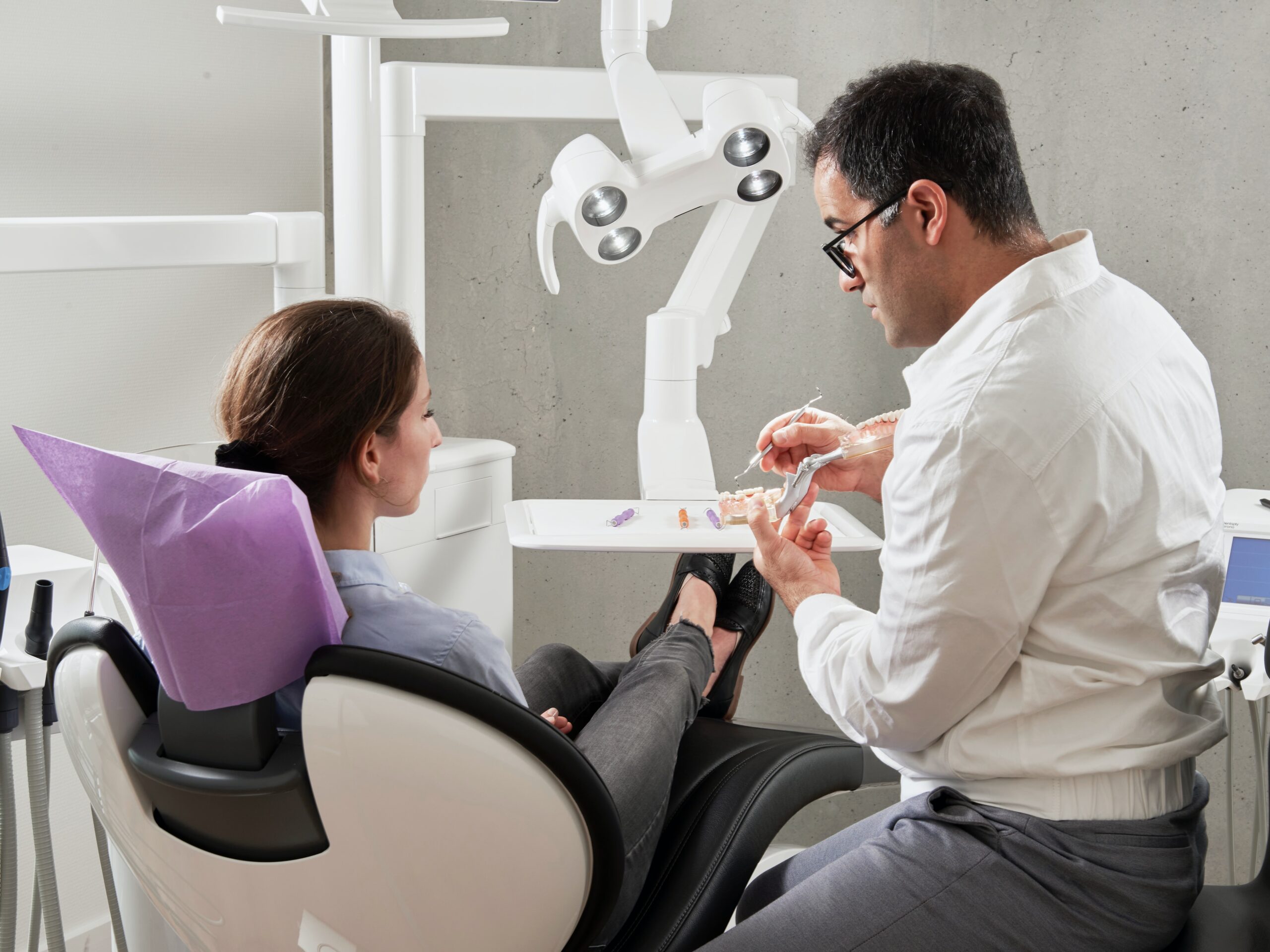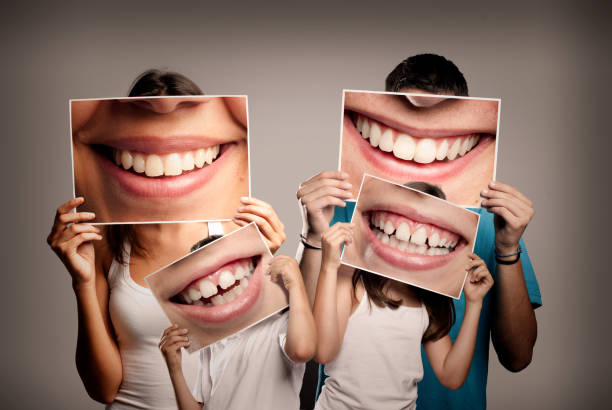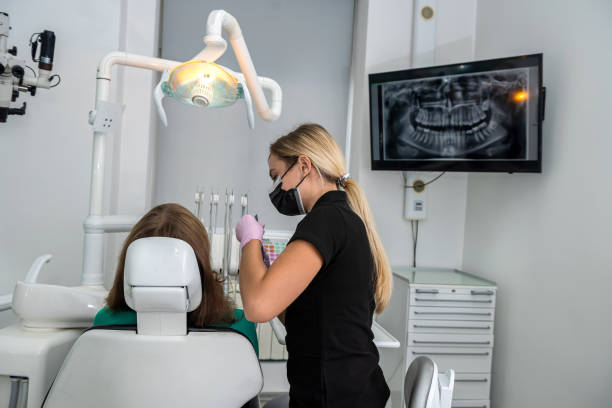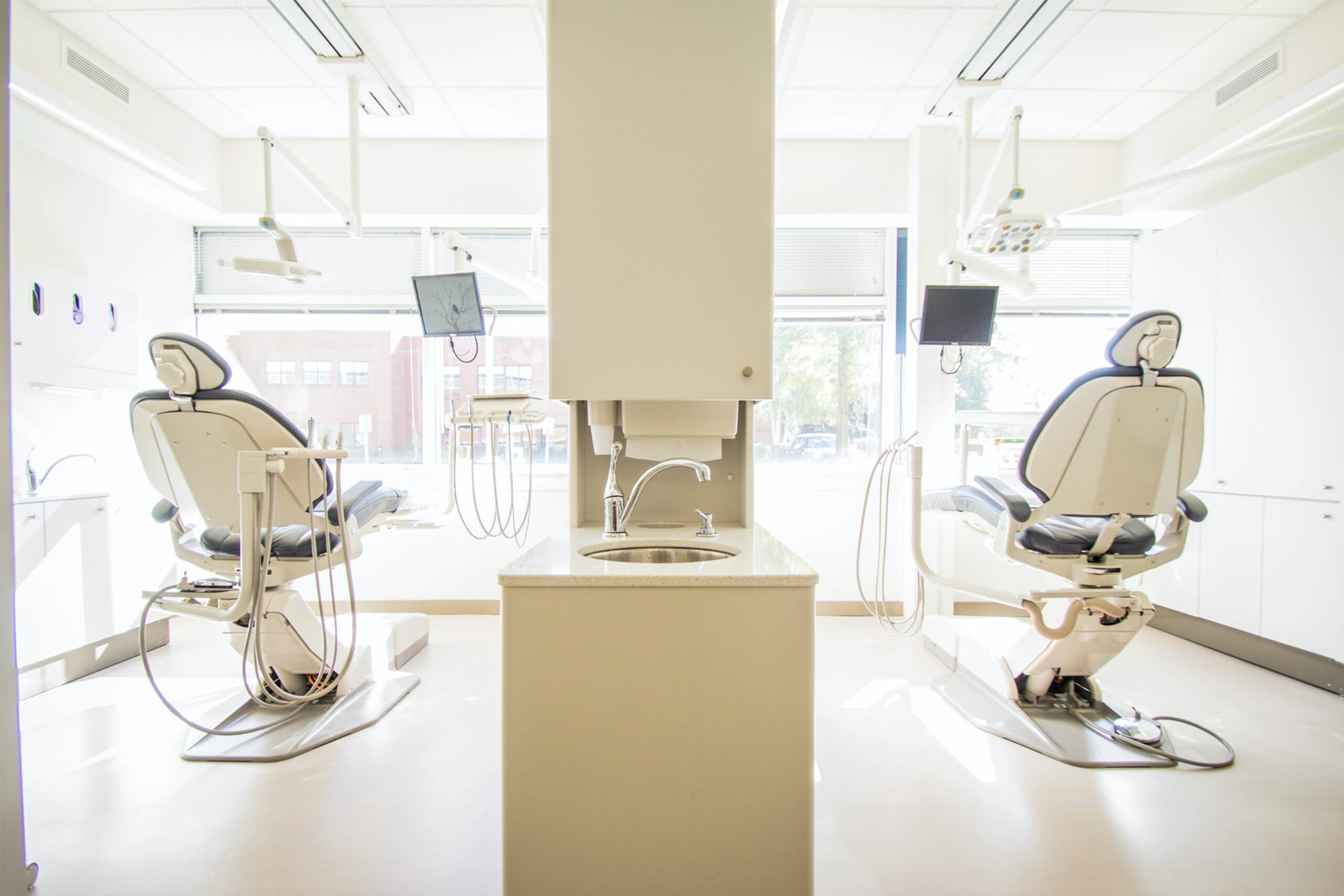Treatments
Teeth Whitening
Teeth whitening is a simple, effective way to brighten a smile that has become dull, yellowed or stained. Our smiles can become dull over time from staining drinks (such as tea, coffee or soda), poor oral hygiene habits, smoking and tobacco use, illness, certain medications, fluorosis and the natural aging process.
We offer professional teeth whitening treatment in our office that uses a powerful whitening gel applied directly to the surface of your teeth. This gel can dramatically whiten your teeth and reduce stains, discoloration and yellowing in your smile. Teeth whitening is often available in both in-office and take-home treatments. With professional teeth whitening, it has never been easier to achieve a whiter, brighter smile!
Our dentist and team may recommend teeth whitening if you have become unhappy or dissatisfied with the appearance of your smile. We will work with you to help you determine the type of whitening and treatment length that will work best for your smile and give you the results you want. Our goal is to give you a beautiful, healthy smile you can enjoy for a lifetime.
If you have any questions about teeth whitening and would like to learn more, please call or visit us at our office today!

Digital X-Rays
Digital X-rays are one of the advanced diagnostic tools we use to provide you with the best possible care. Digital radiography has changed the way we take dental X-rays by making the process faster, more comfortable and more convenient than ever before. Digital X-rays use a digital sensor to take images of your teeth, unlike traditional X-rays that use film. Digital X-rays use significantly less radiation than conventional film X-rays and require the use of no chemicals for developing the images. Our dentist can then instantly view the high-quality images on monitors right in the treatment room to provide you with efficient, accurate diagnoses and care. Our team is able to use digital radiography to identify and diagnose several types of dental problems, such as:
- Decay in between teeth
- Developmental abnormalities
- Improper tooth root positioning
- Cysts and abscesses
- Fractures in existing fillings
- Tumors
- Infection in the tooth nerves
- Bone loss
Digital dental X-rays are used to plan many kinds of dental treatment, such as oral surgery procedures, root canal treatment, dental implants, orthodontics and more. To learn more about digital radiography and how we use X-rays at our office, we welcome you to call or visit us soon.

Dental Cleanings & Exams
As a part of your oral health routine, we recommend that you visit our office for regular dental cleanings and exams. A dental cleaning involves the professional removal of plaque and tartar (also known as dental calculus) from the surface of your teeth. Additionally, our dentist may floss and polish your teeth to promote a healthier, more vibrant smile. This cleaning can help you avoid future tooth decay and harmful periodontal diseases.
As you meet with us, your checkup may involve the following:
- Dental flossing
- Fluoride treatment
- Removal of tooth stains or discolorations
- Screening for tooth decay or gum disease
- X-rays to examine your overall oral health
In addition to your cleaning, our dentist can examine the situation of your oral health and help you determine the proper type of treatment needed to preserve and protect your smile. This may involve the use of digital X-rays, which enable us to view a closer look of your teeth and aid us in detecting hidden oral health issues.
These regular cleanings and exams are essential in furthering the overall health of your smile. We encourage patients to visit with us every six months to help avoid the risk of developing tooth decay or gum disease. You can get started by contacting us today for an appointment!

Emergency Dentistry
A dental emergency is a situation that requires immediate attention from a dental professional. If you are experiencing a dental emergency, we encourage you to contact our office as soon as possible to schedule an emergency visit with our dentist. We understand there is no way to plan for a dental emergency, so please call at any time, and we can arrange an appointment as quickly as possible to minimize damage and any lasting side effects. A dental emergency can include, but is not limited to, the following:
- A cracked, broken, chipped or fractured tooth
- A lost restoration, such as a filling or a crown
- Severe toothaches or any other tooth pain or intense discomfort
- Partially or completely knocked-out tooth
- Damage to any soft tissues in your mouth, including tongue, cheeks, gums and lips
If you are suffering from any of the above conditions, please contact our office immediately. We will provide you with the information you need to prevent any further damage in the time before your emergency visit. Our dentist and team will then be able to assess the damage and restore the health of your smile. If you have experienced trauma to your head or neck, we strongly recommend visiting the emergency room or your general physician before scheduling with us, even if your smile has also been affected. To learn more about dental emergency care, please give our office a call today!

Night Guards
A night guard is a special mouth guard designed to protect your teeth from bruxism, or teeth grinding. Teeth grinding can cause damage to your smile over time, so if our dentist and team suspect you suffer from bruxism, they may recommend a night guard to protect your smile. Many people are unaware of whether they suffer from teeth grinding, as it occurs at night while they sleep. If you are suffering from bruxism, you may be experiencing the following symptoms:
- Chronic jaw, ear or facial pain
- Waking up with a tired or tight feeling in your jaw
- Tension headaches and migraines
- Severe tooth wear that leads to chipped, cracked or flattened teeth
- Worn down tooth enamel, revealing the inner layers of the tooth
- Indentations on the side of the tongue
- Tooth sensitivity
If you suspect you are suffering from bruxism, we recommend you visit our dentist for your very own custom-made night guard. Your night guard will be designed to fit comfortably and effectively protect your teeth from damage, ensuring the lasting health of your smile. To learn more about night guards and how they protect your smile from the negative effects of teeth grinding, we encourage you to contact us today!

Oral Hygiene Counseling
Your oral health and overall wellness are closely linked. The mouth forms a gateway to the rest of the body, and the condition of your teeth, gums and other oral tissues can often affect your general health and well-being. Studies have shown that poor oral health has been linked to heart disease, diabetes, pregnancy complications and other serious medical conditions.
A healthy mouth aids in the nutrition of the physical body, enhances social interaction, and promotes your self-esteem and feeling of general well-being. Your mouth will often provide “signals” to the rest of the body about health problems in the form of ulcers or lesions, bone loss, bleeding or swollen gums, or a reduced saliva flow, to name only a few symptoms. Bacteria in the mouth can cause infection in other areas of the body, and systemic conditions that affect the entire body are also known to have an impact on your oral health.
We encourage you to do everything you can to keep your mouth healthy. This includes:
- Brushing your teeth thoroughly at least twice a day and flossing daily
- Scheduling and keeping all your regular dental visits
- Being aware of your oral health, and telling your dentist about any changes in your overall health (recent illnesses, ongoing conditions, medication use, etc.)
- Refraining from smoking or chewing tobacco
- Managing dry mouth
If you have questions about your oral health or the mouth-body connection, please feel free to contact our office. We will be happy to provide you with more information and schedule your appointment with our dentist.

Tooth Extractions
A tooth extraction is the removal of the tooth. While we tend to avoid removing a tooth whenever possible, sometimes a tooth extraction is necessary to protect the health of your smile. A tooth extraction may be needed to restore the full health of your smile if you have one or more teeth that have become severely damaged in some way, including:
- Severe infection that has destroyed a significant amount or most of the tooth or its supporting bone structure.
- Severe tooth decay that that has damaged a tooth beyond repair and cannot support a restoration
- Crowding of teeth
Our dentist and team take great care in all parts of a tooth extraction to help ensure the process is as comfortable and painless as possible for our patients. We will also provide you with the proper instructions you need so you can take care of your smile as it heals. Following the extraction, we will also discuss your tooth replacement options to restore the appearance and function of your smile.
If you have any questions about tooth extractions and how they can benefit the health of your smile, please call our office today to schedule an appointment with our friendly dentist.

Root Canal Therapy
If your dental pulp is infected, you may suffer from pain, sensitivity, or other discomfort. In these instances, our dentists will usually recommend root canal therapy because an untreated infection in the dental pulp may result in the death of the tooth.
Commonly called a root canal, root canal treatment is a type of endodontic therapy that is often recommended if the tooth pulp and nerves become infected or damaged. This may occur if injury or decay reaches deep into the tooth, past the outer enamel layer. When left untreated, this type of infection and disease may cause the tooth to die and necessitate tooth extraction. To restore the health of the tooth and avoid the need for extraction, our skilled dentists will remove the infected and injured tissues from within the tooth, clean the tooth, and fill it with a medicated material. We will then cap the tooth with a restoration, such as a dental crown, to return the tooth to its original shape and structure. In most cases, a root canal can be completed in only one or two comfortable visits to our office.
Root canal treatment has a reputation for being a painful treatment. In reality, however, root canal treatment can often be completed with minimal discomfort thanks to advanced techniques, tools, and anesthesia. Our dentists, along with our entire dental team, works hard to provide you with a pleasant, comfortable experience each time you visit our office. To learn more about root canal treatment, we welcome you to contact us today. We are committed to restoring your smile’s health.

Dental Crown
Our dentists may also recommend dental crowns because of their ability to restore your smile to optimal comfort.
Your smile may benefit from a crown if a tooth is damaged or decayed to the point that a dental filling will not provide a successful restoration. Crowns can also be used for a number of other restorative and aesthetic purposes, including:
- To protect a tooth following root canal treatment
- To anchor and attach a dental bridge
- To cover and complete a dental implant
- To enhance the beauty of your smile
- To improve a misshapen tooth
- To strengthen a tooth that is fractured or weakened
- To support a large filling when little natural tooth structure remains
To find out whether a dental crown is right for you, we welcome you to contact us today!

Dental Bridges
Our dentist may recommend replacing your missing teeth with a dental bridge. Bridges are designed to replace individual teeth or several teeth in a row, closing the gap caused by the missing teeth to restore your smile as well as your ability to chew and speak normally. Bridges consist of one or more prosthetic teeth anchored in place through the use of two dental crowns, one on either side of the prosthetic tooth or teeth. These crowns hold the artificial tooth in place to help ensure that it will not shift or come loose. Your bridge may also be anchored by a dental implant rather than by crowns.
Bridges are typically recommended to:
- Restore your ability to perform daily actions such as speaking and eating
- Alleviate excess stress on your bite
- Replace partial dentures
- Prevent your remaining teeth from shifting out of position
Bridges have the added benefit of preventing your remaining teeth from shifting out of place, helping you to maintain your smile and improving the shape and volume of your face.
When you receive a dental bridge, plan on at least two appointments with our dentist. During the first visit, we will take impressions and prepare your teeth to receive the bridge. After your bridge has been created, you will return to our office, where our dentist will check that it fits before permanently bonding your bridge into place.
Give us a call today for more information about dental bridges and to set up a consultation with our dentist.

Dental Sealants
Our dentist may recommend a sealant to protect our patients’ smiles from decay. Some patients have teeth with naturally deep grooves that can be difficult to clean properly on their own, which can cause bacteria and debris to build up and cause decay.
A dental sealant is made of a clear or tooth-colored resin material, which is applied directly onto the chewing surfaces of your teeth. The sealant blocks out decay and creates a surface to your tooth that is simple to clean with normal brushing.
Dental sealants are usually recommended for children, as their developing smiles can be sensitive to decay and damage. They are often recommended for permanent molars as soon as they grow in, which usually occurs between the ages of 6 and 12. We may also recommend dental sealants for adults with teeth that are vulnerable and are prone to decay, or for patients who have struggled with tooth decay.
Dental sealants are simple to apply, and they can be placed in just one short visit to our office! Sealants are an easy solution for preventing decay and keeping your smile healthy. To learn more about dental sealants and how they can improve the health of your smile, we invite you to call or visit our office today to schedule an appointment.

Fluoride Treatments
Fluoride is a naturally occurring mineral and can be found in many foods as well as many local water supplies. You receive a certain amount of fluoride from your diet and from using fluoridated toothpaste when brushing your teeth, but sometimes, additional care is needed to help strengthen and protect your teeth. If this is the case for you, our dentist can provide you with a professional fluoride treatment to help protect your teeth from cavities.
As you go about your day, the foods and drinks you consume cause bacteria, sugars and acids to attack and demineralize the enamel of your teeth, gradually wearing your teeth down and eventually leading to the development of cavities. Fluoride works by remineralizing your tooth enamel so that it can more effectively resist decay-causing factors. Fluoride is also important for children, as it helps strengthen teeth as they develop so that they remain strong and healthy in adulthood.
Fluoride treatments can be provided in just a few minutes as part of your regular dental visits. Our dentist will check your mouth during your exams to see if your teeth are at greater risk of tooth decay and will recommend fluoride treatments as needed. This preventive treatment is available for both children and adults, and it may come in the form of a gel, varnish or foam.
To schedule an appointment with our dentist and learn more about the benefits of fluoride treatment, please contact our office today.

Oral Cancer Screening
Oral cancer includes cancers of the lips, mouth, tongue, cheeks, throat, sinuses and hard palate. Oral cancer is one of the more easily treatable cancers, but only when it is caught in its earliest stages. However, most cases of oral cancer are not detected until they have progressed into more advanced, serious stages and become highly difficult to treat. Like any cancer, oral cancer can be life-threatening. Because of this, we are dedicated to providing regular oral cancer screenings to check for disease and get you the necessary treatment to protect your overall health. This screening will usually take place during your regular dental checkups with our dentist and team.
The following are the most common symptoms of oral cancer. If you are experiencing any of the below symptoms, we encourage you to reach out to our dentist and team as soon as possible for an appointment:
- A sore throat that will not go away or frequently returns, or a feeling that you have something caught in the back of your throat
- Bleeding in the mouth with no clear or apparent explanation
- A lasting sore on the face, neck or mouth that does not go away or heal within two weeks
- Unexplained pain or numbness in the face, neck or mouth
- Ear pain
- Any lumps, bumps, rough or tender spots on your lips, gums or any other part of your mouth
- Red, white or spotted patches in or on the mouth
- Increasing difficulty in chewing, swallowing or speaking
- A change in the bite of teeth or dentures, or how they meet together
Our dentist and team will check for these symptoms during every screening to help ensure you and your smile stay in good health. If you have any questions about oral cancer, we encourage you to contact us today.

Dentures
Our dentists at Statesville Dental can offer either complete dentures, to replace all of your teeth, or partial dentures, which are used if you have natural teeth remaining.
Dentures are removable oral appliances used to replace multiple missing teeth. If you are missing several teeth or all of your teeth, dentures might be just what you need to restore the function, beauty, and health of your smile. There are two kinds of dentures: complete dentures and partial dentures.
- A complete denture is used to replace all of the teeth in a full dental arch. We may suggest a complete denture to replace all of the teeth in both arches or just one, depending on your individual needs. Our dentists may suggest using a denture adhesive for improved stability.
- A partial denture is used if you are missing multiple teeth but have remaining natural teeth. A partial denture often includes a thin framework or clasps that attach to the natural teeth for a secure fit.
Our dentists may recommend complete or partial dentures to restore your smile if you are missing multiple teeth; dentures can improve your ability to properly speak and eat, restore your natural facial volume, and enhance the overall beauty of your smile. Your dentures will be custom made to fit your smile comfortably, aesthetically, and securely. We invite you to call or visit us soon to learn more about how dentures can improve your smile!

Gum Disease Prevention
How easy is it to prevent gum disease? Much easier than you may think! The first step is to eat a balanced diet low in sugars and carbohydrates. Plaque is one of the biggest factors in gum disease, and a healthy diet can help prevent the buildup of plaque. If you use tobacco, talk with our dentist and your primary healthcare provider about strategies for quitting.
Your home oral healthcare routine plays an important role in keeping you gums healthy. You should brush your teeth twice a day for two minutes each time, and floss at least once a day. Our dentist can recommend a toothpaste and mouthwash that will promote periodontal health.
Finally, visit our office for your regular dental cleanings and exams. These visits give us the chance to remove the plaque and tartar from your smile. Your checkup also allows our dentist to look for potential problem areas and begin proactive treatments.

Composite Dental Fillings
Traditionally, dental fillings have been made of silver amalgam. However, our dental office uses only composite, or tooth-colored, filling material. Our dentist and team have chosen to use composite filling materials in order to provide you with a more natural-looking result and to promote better long-term oral health. There are many benefits to composite fillings, including:
- Material that bonds to your tooth to provide more support for the tooth’s structural integrity
- Reduced risk of the treated tooth breaking or fracturing in the future
- Insulation from temperature changes caused by foods and beverages
- Better seals around the edges of the damaged area, increasing the tooth’s resistance to decay and leaks
- The ability to correct cavities that are too small for amalgam fillings to repair
- Fillings that can be repaired and replaced without being removed from the tooth
- No mercury or other metals are used, making the filling safer
When you receive a composite dental filling, our dentist will carefully select a filling that matches your natural tooth color to give you a more beautiful and healthier-looking smile. Fillings can usually be placed in a single appointment.
For more information about composite dental fillings and to make an appointment with our dentist, contact our office today.

Dental Crowns
A dental crown is a restoration that serves many purposes. A crown is usually recommended to restore teeth that have become significantly damaged or decayed. Each crown is custom made and designed to perfectly fit your smile. The crown is placed over the damaged tooth to restore the natural appearance, shape and size of the tooth. Dental crowns can be made of gold, porcelain or porcelain fused to metal. Porcelain crowns are a popular choice, as our dentist can match porcelain to the natural color of your smile. During your consultation, we can help you determine which type of crown will work best for you.
Our dentist may recommend a dental crown if you have teeth that have become damaged enough that they cannot be repaired by a dental filling. Crowns serve many purposes, including:
- Completing a dental implant restoration by capping the implant
- Keeping a dental bridge in place
- Correcting misshapen teeth
- Strengthening fractured or weak teeth
- Securing a large filling that your tooth cannot support on its own
- Improving the overall appearance of your smile and your confidence
If you want to learn more about dental crowns and how they can improve your oral health, please call or visit us today! We can help you achieve a healthy and more beautiful smile.

Implant-Supported Dentures
If you have lost multiple teeth, implant-supported dentures could be the solution for you! Our dentist can provide implant-supported dentures to give you a highly stable and long-lasting solution for your oral health and smile. While similar in appearance to traditional dentures, implant-supported dentures are anchored and stabilized using dental implants. This prevents the dentures from coming loose and “floating” in the mouth and gives you the ability to eat and speak with confidence. The implants used in your treatment also take the place of the tooth roots, working to stimulate your supporting jawbone so that it can remain healthy and strong.
When you receive implant-supported dentures, you will need to plan on having several appointments to complete your treatment. The first step of your treatment is the implant placement procedure, during which your implant posts will be surgically inserted into your jawbone. Most cases require a minimum of four implants, though you may receive as many as eight implants depending on your individual needs. Once your implants have been placed and integrated with your supporting bone, our dentist will place and attach your denture to complete your treatment.
Implant-supported dentures are often recommended as a cost-effective alternative to single-tooth implants and traditional dentures. In many cases, our dentist can even retrofit an existing denture with implants.
To learn more about implant-supported dentures and set up a consultation with our dentist, please contact our office today.

Scaling & Root Planning
Scaling and root planing is the most commonly used treatment for patients who are in the beginning stages of gum disease. This procedure is a two-step treatment:
- Scaling: In scaling, we remove the plaque and tartar from the surface of your teeth with handheld or ultrasonic instruments.
- Root Planing: Root planing involves smoothing rough spots on the roots of the teeth and removing any toxins to decrease inflammation of the gum tissue.
The purpose of scaling and root planing is to remove the bacteria, plaque and tartar that are responsible for the progression of gum disease and causing damage to your smile. The process usually involves little to no discomfort, but our dentist may recommend several anesthetic options if you are highly sensitive or would like to feel more relaxed during the treatment. Scaling and root planing can be done in a single visit, but depending on your condition, our dentist may recommend multiple sessions to help ensure the protection of your oral health.
You may receive other periodontal treatments in addition to scaling and root planing, depending on the severity of the infection. However, scaling and root planing is usually enough to treat most patients who are suffering from gum disease. To learn more about how scaling and root planing can benefit you, please call or visit us today!
Statesville Dental
Contact
(704) 873-4271
information@statesvilledental.com
Address
1207 Davie Ave
Statesville, NC 28677
Hours
Mon-Thurs: 8:30am-4pm